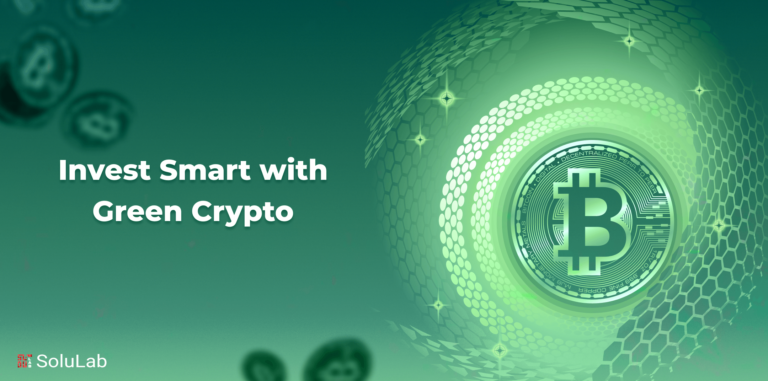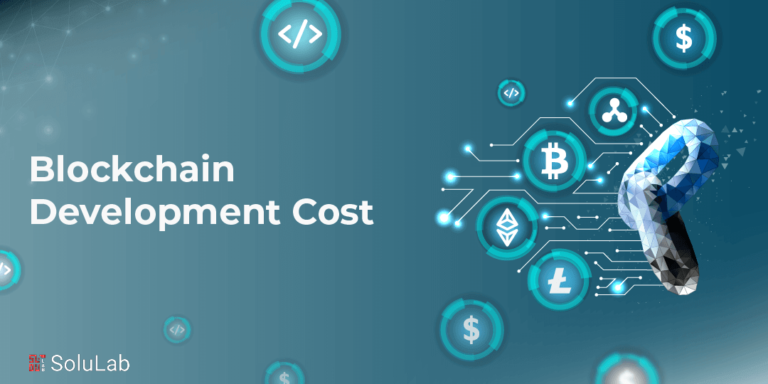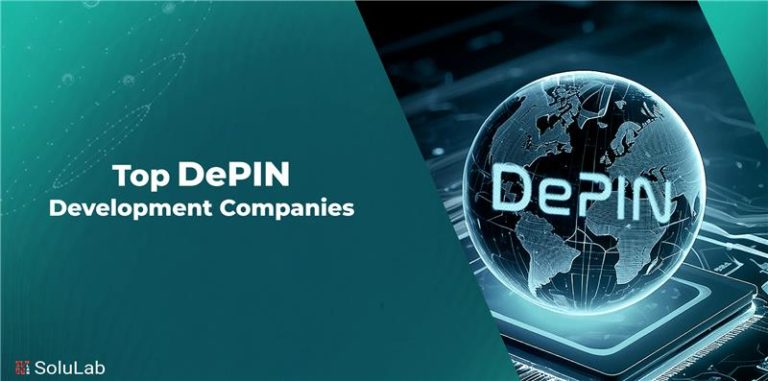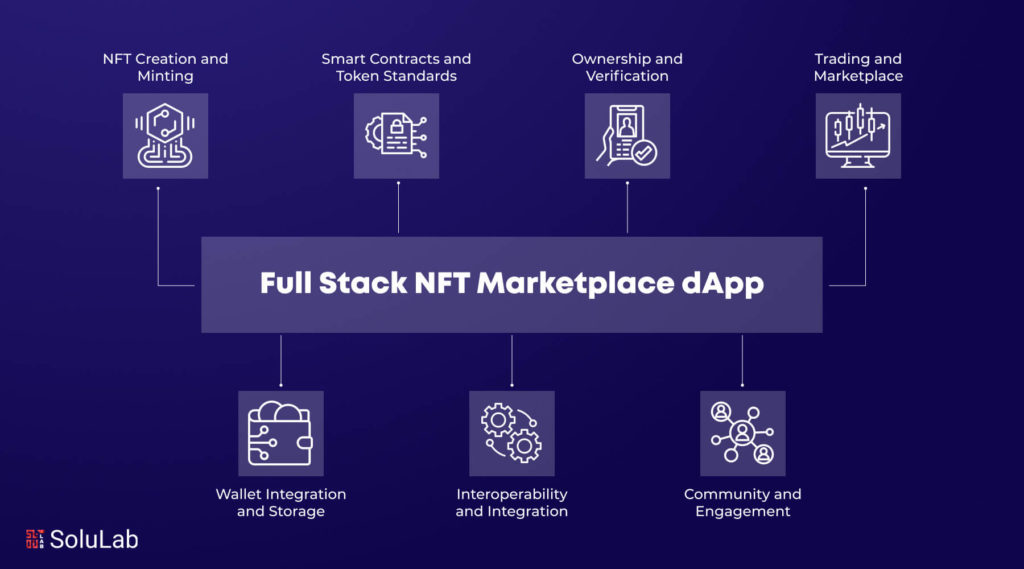
The emergence of Non-Fungible Tokens (NFTs) has revolutionized the digital world, enabling the ownership and trading of unique digital assets. NFT decentralized applications (dApps) have further propelled this trend, providing platforms where users can create, buy, sell, and interact with NFTs in a decentralized manner. In this blog, we will explore what NFT dApps are and delve into the process of launching a full-stack NFT marketplace dApp.
NFT dApps are decentralized applications built on blockchain networks that facilitate the creation, ownership, and exchange of non-fungible tokens. These dApps typically consist of a front-end user interface, smart contracts governing the token standards and marketplace functionalities, and a back-end infrastructure for data management and communication with the blockchain network. NFT dApps offer a decentralized and transparent environment where users can create, showcase, and trade NFTs.
Launching a full-stack NFT marketplace dApp involves several key steps. Firstly, you need to choose a blockchain network that supports NFT functionality and smart contracts, such as Ethereum or Cardano. Next, you’ll develop the smart contracts that define the NFT standard, including the characteristics and functionalities of the tokens. These smart contracts serve as the backbone of the NFT marketplace dApp, handling the creation, ownership, and trading of NFTs.
What are the Advantages of Developing an NFT dApps
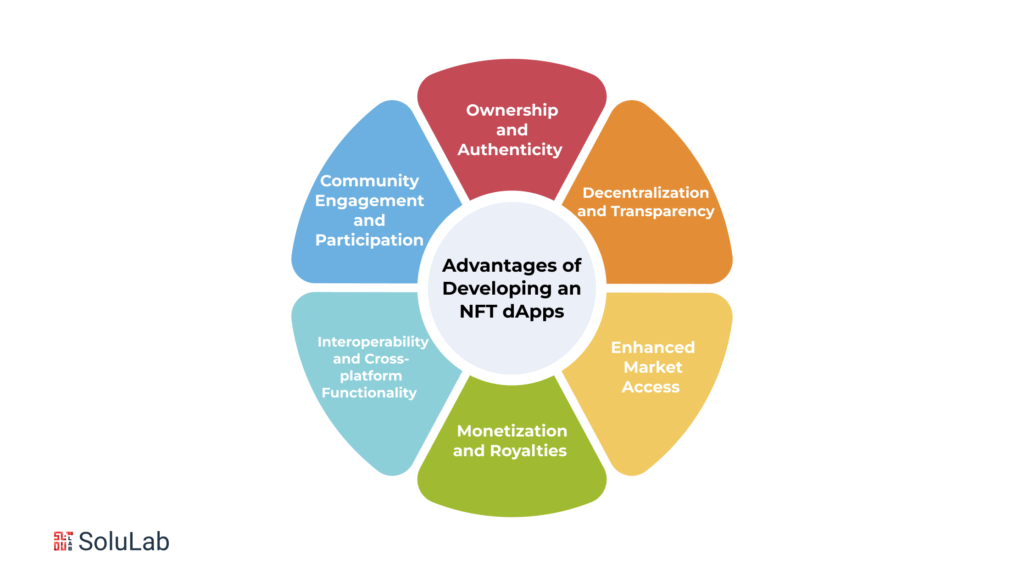
Developing NFT dApps (Non-Fungible Token decentralized applications) brings forth many advantages that contribute to the growth and innovation of the blockchain ecosystem. These applications harness the unique features of NFTs, allowing developers to create platforms that revolutionize various industries. Here are some key advantages of developing NFT dApps:
-
Ownership and Authenticity
NFT dApps enable users to establish ownership and verify the authenticity of digital assets. By leveraging blockchain technology, each NFT possesses a unique identifier, guaranteeing its uniqueness and preventing duplication or counterfeiting. This feature is precious in industries such as art, collectibles, and virtual real estate, where provenance and ownership verification are paramount.
-
Decentralization and Transparency
NFT dApps operate on decentralized networks, ensuring transparency and eliminating the need for intermediaries. With smart contracts governing NFT transactions, the entire process becomes automated and executed according to predefined rules. This transparency fosters trust among users, as all transaction details are immutably recorded on the blockchain, creating a secure and auditable environment.
Related: Top 10 dApp Development Companies
-
Enhanced Market Access
Developing NFT dApps opens up opportunities for creators and collectors to access global markets. Traditional barriers, such as geographical limitations or exclusive gatekeepers, are overcome as anyone with an internet connection can participate in NFT transactions. This democratization of markets allows creators to reach a wider audience, while collectors have access to a diverse range of digital assets from around the world.
-
Monetization and Royalties
NFT dApps empower creators by providing avenues for monetizing their work. Artists, musicians, game developers, and content creators can tokenize their creations as NFTs and earn royalties whenever their assets are sold or used within the dApp ecosystem. This creates sustainable revenue streams and eliminates the reliance on traditional distribution models, giving creators more control over their intellectual property and fostering a direct relationship with their audience.
-
Interoperability and Cross-platform Functionality
NFT dApps can be designed to be interoperable across different blockchain networks, enhancing flexibility and user experience. By utilizing cross-chain protocols, NFTs can be seamlessly transferred and used across multiple platforms and ecosystems, allowing for broader adoption and utilization of digital assets. Interoperability expands the potential user base and unlocks the value of NFTs beyond a single blockchain network.
-
Community Engagement and Participation
NFT dApps foster vibrant communities where users can connect, collaborate, and engage with like-minded individuals. These communities create a sense of belonging and provide opportunities for social interactions, discussions, and collaborations. NFT dApps often incorporate features such as forums, chat functionalities, and social profiles, enhancing the overall user experience and encouraging community participation.
What is the NFT marketplace dApp Development Cost?
The cost of developing an NFT marketplace dApp can vary significantly depending on several factors. These factors include the complexity of the platform, the desired features and functionalities, the technology stack used, the development team’s rates and location, and the timeline for development. While it is challenging to provide an exact cost estimate without specific project details, we can provide a general overview of the factors that influence the development cost.
-
Design and User Interface (UI/UX)
The design and user interface of the NFT marketplace dApp plays a crucial role in attracting and retaining users. The complexity and customization requirements of the design can impact the development cost.
-
Smart Contract Development
NFT dApps rely on smart contract development to manage the creation, ownership, and transactions of NFTs. The complexity of smart contracts, including functionalities like minting, transferring, and royalties, will influence the development cost.
-
Backend Development
Backend development involves setting up the infrastructure, integrating with the chosen blockchain network, implementing APIs, and building the necessary databases and servers. The complexity and scalability requirements of the backend will impact the development cost.
-
Frontend Development
The frontend development of the dApp marketplace involves creating the user interface and implementing functionalities like search, filtering, user authentication, and wallet integration. The complexity and customization of the front end will affect the development cost.
Related: Solana NFT Marketplace: How to build your own NFT Marketplace on Solana
-
Integration with Blockchain
Integrating the NFT marketplace dApp with the chosen blockchain network involves interacting with the blockchain’s smart contracts, handling transactions, and integrating wallet functionalities. The complexity of the integration and the chosen blockchain network can influence the development cost.
-
Testing and Quality Assurance
thorough testing and quality assurance are essential to ensure the security and functionality of the NFT marketplace dApp. The extent of testing required and the complexity of the functionalities will impact the development cost.
-
Deployment and Maintenance
Deploying the dApp marketplace to a live environment and ongoing maintenance and updates will also incur costs. Consider the server infrastructure, security measures, and ongoing support required for the marketplace.
How Does a dApps NFT Work?
DApps (decentralized applications) that incorporate NFTs (Non-Fungible Tokens) work by leveraging blockchain technology to enable the creation, ownership, and trading of unique digital assets. Here’s a simplified explanation of how a dApp NFT ecosystem operates:
1. NFT Creation and Minting
The dApp allows creators to mint NFTs, which involves tokenizing a digital asset and associating it with a unique identifier on the blockchain. This process establishes the ownership and authenticity of the asset. Creators can mint NFTs representing various digital items such as artwork, music, videos, virtual real estate, collectibles, and more.
2. Smart Contracts and Token Standards
The NFTs within the dApp ecosystem are governed by smart contracts, self-executing agreements stored on the blockchain. These smart contracts define the rules and functionalities associated with NFTs. For instance, the contract may include details on the transferability, royalties, and other attributes of the NFTs. Token standards like ERC-721 or ERC-1155 (on Ethereum) or specific standards on other blockchain networks facilitate the interoperability and standardization of NFTs.
3. Ownership and Verification
The blockchain acts as a decentralized ledger that records all NFT transactions, establishing a transparent and immutable history of ownership. Each NFT has a unique identifier that verifies its authenticity and ownership. This verification process allows collectors to confirm the provenance of an NFT and verify that it is an original creation.
4. Trading and Marketplace
NFTs within the dApp ecosystem can be bought, sold, and traded in a decentralized marketplace. The marketplace provides a platform for creators and collectors to interact and engage in transactions. Sellers can list their NFTs for sale, set prices or auction formats, and receive payment in cryptocurrencies. Buyers can browse through the marketplace, discover NFTs, and make purchases using their digital wallets.
5. Wallet Integration and Storage
To participate in the dApp NFT ecosystem, users need a digital wallet that is compatible with the blockchain network supporting the dApp. The wallet allows users to securely store and manage their NFTs. It also enables users to interact with the dApp, initiate transactions, and showcase their NFT collections.
6. Interoperability and Integration
NFTs created within a dApp ecosystem can be interoperable, allowing for seamless integration with other dApps or platforms. This interoperability enables users to transfer their NFTs between different applications or marketplaces, expanding the potential use cases and value of the NFTs.
7. Community and Engagement
DApp NFT ecosystems foster vibrant communities where creators, collectors, and enthusiasts can connect, collaborate, and participate. Users can engage in discussions, share insights, showcase their collections, and participate in events and auctions. The community aspect adds depth and social interaction to the NFT ecosystem.
How to Hire the Best NFT Marketplace dApp Development Company?
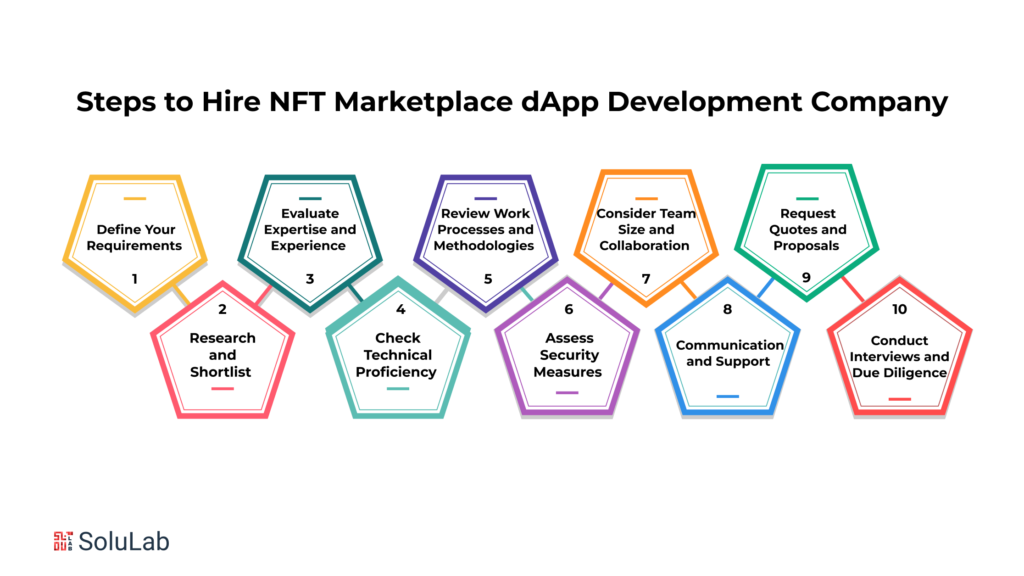
When looking to hire the best NFT (Non-Fungible Token) marketplace dApp development company, it’s essential to consider several factors to ensure a successful and high-quality outcome. Here are some steps to guide you in the hiring process:
1. Define Your Requirements
Before initiating the hiring process, clearly define your project requirements and objectives. Determine the scope, desired features, timeline, and budget for your NFT marketplace dApp. This will help you communicate effectively with potential development companies and evaluate their suitability for your project.
2. Research and Shortlist
Conduct thorough research to identify reputable NFT marketplace development companies. Explore their websites, portfolios, case studies, and client testimonials to assess their expertise and track record. Shortlist companies that have experience in blockchain development, NFTs, and dApp creation.
3. Evaluate Expertise and Experience
Assess the expertise and experience of the shortlisted companies. Look for teams that have extensive knowledge of blockchain technologies, smart contract development, and decentralized application development. Consider their experience with NFT marketplace dApps, including successful projects they have completed in the past.
4. Check Technical Proficiency
Evaluate the technical proficiency of the development companies. Look for teams that have experience working with the top blockchain platforms of your choice, whether it’s Ethereum, Cardano, or another platform. Ensure they have a solid understanding of smart contract development, blockchain integration, and frontend and backend technologies.
5. Review Work Processes and Methodologies
Inquire about the company’s work process and methodologies. Look for teams that follow agile methodologies, as they provide flexibility and adaptability throughout the development lifecycle. Ask about their communication channels, project management tools, and transparency in reporting progress and updates.
6. Assess Security Measures
Security is paramount in blockchain development. Inquire about the company’s approach to security and its experience in implementing robust security measures. Discuss how they ensure the integrity of smart contracts, protect user data, and handle vulnerabilities and potential threats.
7. Consider Team Size and Collaboration
Evaluate the size of the development team and their ability to handle your project effectively. Consider their availability and willingness to collaborate closely with you throughout the development process. A dedicated and communicative team is essential for successful project execution.
8. Communication and Support
Strong communication is crucial for a smooth collaboration. Assess the company’s responsiveness, clarity in communication, and willingness to understand your requirements. Inquire about their post-development support, including bug fixes, updates, and maintenance.
9. Request Quotes and Proposals
Request detailed quotes and proposals from the shortlisted companies. Evaluate the cost estimates, project timelines, and deliverables provided in each proposal. Consider the overall value offered by each company about their expertise and experience.
10. Conduct Interviews and Due Diligence
Narrow down your options and conduct interviews with the top contenders. Use this opportunity to ask in-depth questions, assess their cultural fit, and gain a better understanding of their capabilities. Conduct due diligence by checking references and reaching out to their previous clients for feedback.
Conclusion
In exploring NFT dApps and the process of launching a full-stack NFT marketplace dApp, it’s clear that these decentralized applications represent a revolutionary force in digital ownership and asset trading. Leveraging blockchain technology, dApp NFT solutions offer unprecedented transparency, security, and decentralized control over digital assets like art, collectibles, and virtual real estate. As a leading dApp development company, SoluLab stands at the forefront of this transformative technology, providing comprehensive services from ideation to deployment. Their expertise ensures that businesses and entrepreneurs can navigate the complexities of NFT marketplace development with confidence, tapping into the burgeoning market of digital collectibles and enhancing user engagement through innovative blockchain solutions.
For those looking to capitalize on the NFT boom or integrate blockchain-based solutions into their business models, partnering with a trusted dApp NFT development firm like SoluLab is essential. By harnessing their specialized knowledge and industry experience, organizations can not only launch successful NFT marketplace dApps but also position themselves at the forefront of the digital economy, driving innovation and unlocking new avenues of growth in the decentralized future.
FAQs
1. What are NFTs (Non-Fungible Tokens) and how do they work?
Non-Fungible Tokens (NFTs) are unique digital assets that represent ownership or proof of authenticity of a specific item or piece of content, such as art, music, videos, or virtual real estate. Unlike cryptocurrencies like Bitcoin, each NFT is distinct and cannot be exchanged on a one-to-one basis due to its unique properties recorded on a blockchain.
2. Why hire NFT developers for my project?
Hiring NFT developers ensures expertise in blockchain technology, smart contract development, and NFT standards like ERC-721 and ERC-1155. These developers can create custom NFT solutions tailored to your business needs, ensuring secure and efficient management of digital assets on decentralized platforms.
3. What services do NFT development companies offer?
NFT development companies provide a range of services including NFT marketplace development, smart contract creation, token minting, digital wallet integration, decentralized app (dApp) development, and blockchain consulting. These services facilitate the creation, trading, and management of NFTs across various industries.
4. How do I choose the right NFT service provider?
When selecting an NFT service provider, consider their experience in blockchain development, portfolio of previous projects, adherence to security standards, understanding of NFT marketplace dynamics, and ability to scale solutions. Ensure they align with your project requirements and can provide ongoing support post-deployment.
5. What are the benefits of integrating NFTs into my business?
Integrating NFTs into your business can unlock new revenue streams through digital asset sales and royalties. It enhances customer engagement by offering unique and collectible digital content, establishes authenticity and ownership verification, and expands market reach in the growing NFT ecosystem.




